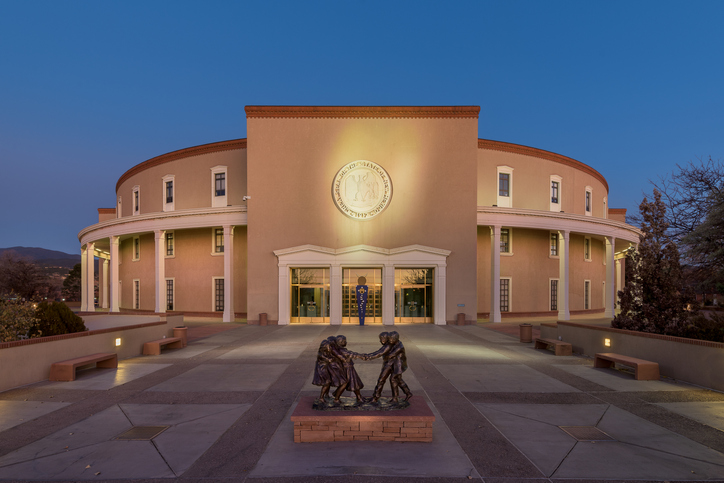Throughout 2021, many states suffered from labor shortages, unprecedented inflation, and an ever-worsening supply chain crisis. Because of the perilous economic situation, several states are considering quick fixes to address their financial problems, even though these so-called quick fixes would likely make matters worse over the long term.
In the Land of Enchantment, some lawmakers have been pushing for continual increases in the state’s minimum wage. As of January 1, 2022, New Mexico’s minimum wage hit $11.50 per hour despite clear economic effects that raising the minimum wage worsens inflation and disproportionately harms small businesses. Along with this recent minimum wage increase, lawmakers in the New Mexico House of Representatives have proposed House Bill 137. This legislation would require a state agency that contracts for services to include payments and reimbursements to workers and contractors in accordance with state minimum wage increases. While this bill is rooted in fairness and common sense, it is paramount for New Mexico lawmakers and constituents to remember the consequences associated with minimum wage increases across the board.
Minimum wage increases are a deeply ineffective way to improve the economy. Moreover, arbitrary minimum wage hikes produce unintended consequences that often inflict even more pain upon the very people they are supposed to benefit. In almost every scenario, minimum wage hikes result in some workers seeing their wages rise, while many more lose gainful employment.
Minimum wage hikes rarely meet the expectations of the policymakers who advocate for them. For example, they do not raise the living standards in any appreciable way for individuals and families, yet illogical wage increases have the propensity to shutter small businesses for good.
Minimum wage hikes also inflict a myriad of unintended consequences upon all businesses, especially small businesses—the backbone of the American economy. In New Mexico, minimum wage increases would force businesses to reallocate their costs to cover the increase in employees’ wages, ultimately forcing them to alter spending elsewhere to offset their newly increased labor costs. More times than not, this results in less hiring, a reduction in work hours, and increased prices for consumers. This is often the small margin between staying open and bankruptcy for small businesses, which typically operate on slim margins to begin with.
As mentioned above, every state experienced some degree of state and federally imposed lockdowns and shelter-in-place orders due to the sudden onset of the coronavirus pandemic, which sent shockwaves throughout the small business ecosystem that are still being felt. Therefore, a minimum wage hike in 2022 could not be more ill-timed. In an analysis based on self-recorded closures in their database, Yelp estimates that 60 percent of U.S. businesses that have closed since the start of the COVID-19 pandemic have shut down permanently.
A recent report from the Employment Policies Institute (EPI) found that a minimum wage of $15 per hour would cost the U.S. economy two million jobs when analyzing the economic effects of a federal $15 per hour minimum wage. The EPI study notes that of those two million, the jobs most likely to vanish are those in the restaurant and hospitality industries. Considering that these two sectors were decimated by the pandemic, this would be an unwise decision. Forcing businesses in these industries, particularly small businesses, to drastically raise their labor costs would decimate the few that have hung-on during the pandemic.
Furthermore, closed businesses don’t pay property taxes, income taxes, sales and use taxes, and the dozens of other licensing and regulatory fees that governments rely on for revenue. Thus, minimum wage hikes, like the one being considered in New Mexico, could result in further reducing the revenue flow to the state, exacerbating the budget shortfall caused by the coronavirus pandemic. While seemingly politically popular, the downstream effects of a minimum wage increase would certainly create more challenges for New Mexico’s budget over the long term.
Minimum wage hikes are never a viable economic solution. A 2007 study from economists at the University of California-Irvine and the Federal Reserve Board comprehensively examined the body of work on the subject and found 85 percent of the studies they considered credible demonstrate minimum wage hikes cause job losses for less-skilled employees. Furthermore, a 2010 study by economists at Cornell University and American University found no reduction in poverty in the 28 states that raised their minimum wage laws from 2003 to 2007.
It is disingenuous for New Mexico lawmakers to push minimum wage hikes, which as a function of themselves result in business closings and increased unemployment, especially when unemployment has skyrocketed due to the ongoing pandemic. According to Wallethub, New Mexico experienced a 15.2 percent increase in unemployment from December 2019 to December 2021.
The EPI report also estimates that a $15 per hour minimum wage in the Land of Enchantment would result in 18,000 jobs lost by 2027. New Mexico absolutely cannot afford to lose almost 20,000 jobs over the next five years.
Although attempts to boost a minimum standard of living and protecting low-skilled workers in a pandemic-world are praiseworthy, the evidence is clear: minimum wage hikes do more harm than good. Raising the state’s minimum wage would do little to elevate residents of New Mexico out of poverty while annihilating entry-level jobs throughout the state.
